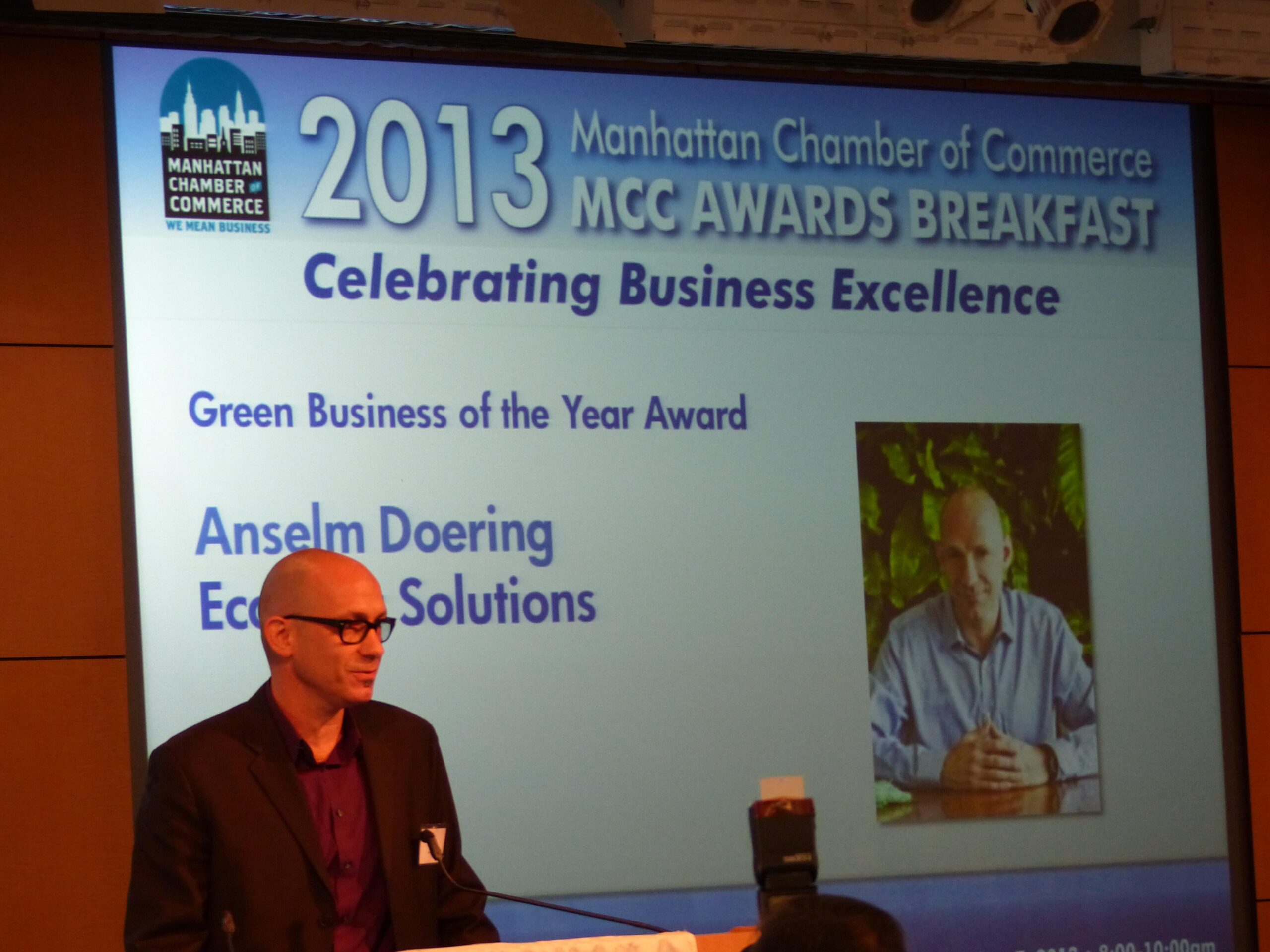Last week I was at an important event here in New York City for small businesses. And was beaming like a proud parent.
Except it wasn’t for my child, but for my brother, Anselm.
He was receiving the Green Small Business Award for 2013 from the Manhattan Chamber of Commerce for his booming company, Ecologic Solutions, manufacturer of environmentally-preferable cleaning products.
Well into the 7-figures in sales, Ecologic is a truly “deep green” small business. His company:
a) uses best practices for environmental and social issues
b) is heavily involved in their communities
c) speaks loudly about their sustainability practices
d) powerfully leverages their business model to ramp up sales
 For example, Ecologic works with a local non-profit in Brooklyn, Industries for the Blind (NYCIB), using the visually-impaired to package their cleaning products for some of their customers.
For example, Ecologic works with a local non-profit in Brooklyn, Industries for the Blind (NYCIB), using the visually-impaired to package their cleaning products for some of their customers.
A few years ago, my brother landed a major City contract because they were working with NYCIB. In fact, the City representative told Anselm they didn’t even need to put out a request for proposal (RFP) since Ecologic partnered with NYCIB.
Ecologic did not do this with NYCIB to get the City contract. Instead, they did it because it was a really great opportunity to employ/train some people who desperately need it.
This is just one of many reasons why Ecologic won the Green Business Award this year.
One of the major competitive advantages Anselm’s company has is against all the other cleaning chemical companies, especially those who claim to be green/sustainable, but really are just blowing smoke.
Greenwashing— used to describe the practice of companies disingenuously spinning their products and policies as environmentally friendly, such as by presenting cost cuts as reductions in use of resources. It is a deceptive use of green PR or green marketing.
How best to integrate sustainability into your business:
- Your actions. It’s one thing to say it, it’s completely another to do it. Examples: most of the “green” dry cleaners are greenwashing. They use toxic chemicals, non-renewable resources and huge amounts of energy, among other things. http://online.wsj.com/news/articles/SB122834783552077505
- Your understanding. The impact of what you do in your industry. i.e. Google green dry cleaning, and read the first few articles from reputable sources.
- Your chain. What are your suppliers’ actions?
- Your involvement. In your community. Learn about what other businesses are doing, through websites like ethikus.com.
- Your buzz. What others say about you. Twitter, Facebook, and YouTube, for example.
- Your reviews. What are the experts saying about you? On places like Treehugger.com, Greenbiz.com, and businessgreen.com.
This can get overwhelming quickly for many entrepreneurs new to using sustainable business practices.
Tips on How to Promote Being Green… Authentically:
- Educate— once your stakeholders learn more about the issues, they often will change. Example: Divestment campaign in S. Africa to boycott Apartheid in the 80’s.
- Be open— sustainability issues often evolve and change over time. Your information may be outdated and inaccurate.
- Stay curious— on the social and environmental topics most important to you along with the solutions others come up with.
- Leverage— your green activities. Most customers are loyal to sustainable businesses, when other factors remain relatively equal (i.e.: functionality, availability, product attractiveness, functionality and pricing.)
- Integrate honesty—about what you know and don’t, and what you do, and don’t do. Also, never be self-righteous, unless you don’t mind becoming alienated.
What I am most proud of Anselm is that Ecologic Solutions is a living example of a truly sustainable business. They are leaders in their industry and a role model for other businesses to follow. Ecologic implements highly creative ways to aggressively grow the business while leveraging their actions in the communities they are involved in as well as the positive impact they are having on our planet.
If you are a leader in your industry, you, too, can do this. And most likely with UnReasonable results!
Action Steps for the Week
How have you been branding your business? To position it as a sustainable business, consider implementing the following:
- Get a third party endorsement—B Labs will get you B Certified.
- Actively get involved with one or two community-based initiatives that you can (authentically) tie back to what you do in your business. Hire the trained underprivileged, have your staff volunteer for a charity of their choice for one day a week (paid), or strategically ally with a non-profit focusing on generating positive things in your community.
- Reduce your carbon footprint—and often times, save significant expenses. Do video-conferencing instead of flying, for example.
You will notice that the more you do, the greater your competitive advantage.
And soon you will most likely see a serious ROI from your clients, happier and more engaged employees, and a community who actively promotes your business.
And we can all use more of that in our businesses!
